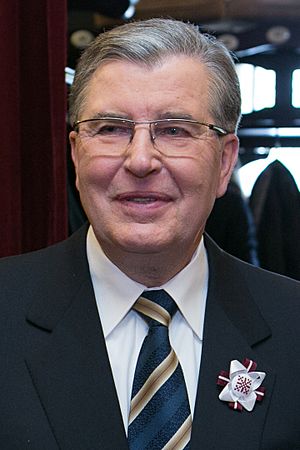Anatolijs Gorbunovs facts for kids
Quick facts for kids
Anatolijs Gorbunovs
|
|
|---|---|
|
Анатолий Горбунов
|
|

Gorbunovs in 2015
|
|
| Speaker of the Saeima | |
| In office 6 July 1993 – 7 November 1995 |
|
| Preceded by | Position established (Himself as Chairman of the Supreme Council) |
| Succeeded by | Ilga Kreituse |
| Chairman of the Supreme Council | |
| In office 3 May 1990 – 6 July 1993 |
|
| Preceded by | Position established (Himself as Chairman of the Supreme Soviet) |
| Succeeded by | Position abolished (Himself as Speaker of the Saeima Guntis Ulmanis as President of Latvia) |
| Chairman of the Supreme Soviet | |
| Preceded by | Aleksandrs Drīzulis |
| Succeeded by | Position abolished (Himself as Chairman of the Supreme Council) |
| Personal details | |
| Born | 10 February 1942 |
| Political party | Latvian Way |
| Other political affiliations |
Communist Party of Latvia (until 1991) |
Anatolijs Gorbunovs is a Latvian politician. He was born on February 10, 1942. He played a very important role in Latvia's history.
He was the leader of the Supreme Soviet during the last years of Soviet rule in Latvia. After Latvia became independent again, he led the Supreme Council. He was like the acting head of state for a while. Later, he became the Speaker of the Saeima (Latvia's parliament).
Contents
Anatolijs Gorbunovs: A Leader for Latvia
Anatolijs Gorbunovs helped Latvia become an independent country again. He held several key positions during this important time. His work helped shape modern Latvia.
Early Political Life
From 1974 to 1988, Anatolijs Gorbunovs worked in the Communist Party of Latvia. He held different jobs there. His highest position was Secretary of the Central Committee.
Unlike many others in the Communist Party, Gorbunovs supported Latvia becoming independent. This was a big step at that time.
Leading Latvia to Independence
From 1988 to 1990, he was the Chairman of the Presidium of the Supreme Soviet. In 1990, he led a special meeting. At this meeting, the Supreme Soviet declared that the Soviet Union had occupied Latvia. They said Latvia's joining the Soviet Union was not valid. This started a period of change for Latvia to become fully independent.
Gorbunovs continued to lead this group. It was renamed the Supreme Council of Latvia. He stayed in this role until 1993.
Acting President and Speaker of Parliament
When Latvia became truly independent in 1991, Gorbunovs became the acting President of Latvia. This was because he was the speaker of the parliament. He served as acting president until 1993. Then, Guntis Ulmanis was elected as the new president.
In 1993, Gorbunovs joined a political party called Latvian Way. He was then elected as the Speaker of the Saeima. He held this important job until 1995.
He continued to be a member of parliament until 2002. Between 1995 and 2002, he also served as a minister. He was the Minister of Regional Development and the Minister of Transportation. He also worked as a Deputy Prime Minister.
| Political offices | ||
|---|---|---|
| Preceded by Kārlis Ulmanis |
Acting President of Latvia 1991–1993 |
Succeeded by Guntis Ulmanis |
| Preceded by Pauls Kalniņš |
Speaker of the Saeima 1993–1995 |
Succeeded by Ilga Kreituse |
Awards and Recognition
Anatolijs Gorbunovs has received many awards for his work. These awards show how important his contributions were to Latvia.
- Order of the Badge of Honour (USSR, 1981)
- Order of the Three Stars, 2nd Class (1995)
- Order of the Dannebrog, Commander 1st Class (Denmark, 1997)
- Order of the Cross of Terra Mariana, 1st Class (Estonia, 2002)
- Medal of the Baltic Assembly (2011)
- The Cicero Award (Latvian: Cicerona balva) from the Latvian Academy of Sciences (2012)
See also
 In Spanish: Anatolijs Gorbunovs para niños
In Spanish: Anatolijs Gorbunovs para niños
 | Aaron Henry |
 | T. R. M. Howard |
 | Jesse Jackson |

